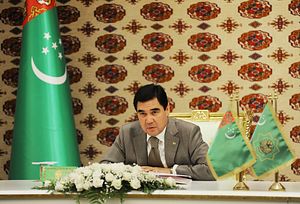Tajikistan’s President Emomali Rahmon visited his Turkmen counterpart in Ashgabat today, signing a handful of deals. The visit, which comes two weeks after Turkmen President Gurbanguly Berdimuhamedov made his first visit to Kyrgyzstan, points to a deliberate, though certainly limited, opening of the closed country. As Turkmenistan looks toward celebrating its 20th anniversary of neutrality in December, it seems poised to shed at least a modicum of the associated isolation. The motivation for this is simple: the large energy projects Turkmenistan wants to complete all require better relations with a select few countries, with which it has made increased diplomatic efforts in recent months.
According to Asia-Plus, the agreements signed between Rahmon and Berdimuhamedov pertained to cooperation in the realms of communications (TV and radio broadcasting), health, libraries, and foreign affairs. But the discussions were much broader, touching on initiatives to increase bilateral trade and cooperation. Specifically, the Tajik press statement says, “[T]his refers to the creation of joint ventures, the opening of trading houses, closer cooperation in the field of transport, simplification of travel for business, and the maintenance of the Joint Intergovernmental Commission on trade and economic co-operation in the active mode.”
The Tajik statement also notes that simplifying the movement of people and cargo through Turkmenistan was a priority, by land and by air: “We believe that the establishment of direct air and passenger rail service between the two capitals would become a powerful factor for the further development of trade and economic relations between our countries.”
Turkmenistan remains the only Central Asian country that requires citizens of all neighboring countries to obtain a visa before visiting–with tiny exceptions (visits lasting five days or less) for people living in select bordering communities in Kazakhstan and Uzbekistan. Though many statements have been made in the past, both by Berdimuhamedov and other regional leaders, about the need to ease travel over borders, there is little overall progress on that front.
The Turkmen statement on the visit focuses on development and stability, mentioning the agreements signed but also highlighting discussions relating to Afghanistan–both security and major transport and energy projects. Interestingly, the Turkmen statement mentions energy (and gas pipelines) while the Tajik statement does not.
It wouldn’t be a bilateral meeting in Central Asia without references to security. The Tajik statement notes mutual concern about extremists and the “activation of radical organizations at our southern borders” and the Turkmen statement references international terrorism, drug trafficking, and trouble in Afghanistan.
In recent months, Turkmenistan has engaged with the European Union, then separately with Italy and Austria. The United Nations’ secretary general visited in June, Indian Prime Minister Narendra Modi visited in July, and in early August Berdimuhamedov traveled to Kyrgyzstan for the first time since coming to power in 2006. Turkmenistan is gearing up to use its December neutrality celebrations–to which it has invited all of its neighbors–as a pivotal moment. It announced in early August that in December the must-discussed TAPI project will finally break ground.

































